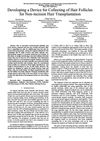 20 citations,
March 1994 in “Clinical and Experimental Dermatology”
20 citations,
March 1994 in “Clinical and Experimental Dermatology” Too much topical minoxidil can cause excessive hair growth, but stopping treatment reverses it.
 19 citations,
May 2017 in “Dermatologic Surgery”
19 citations,
May 2017 in “Dermatologic Surgery” Combining platelet-rich plasma with 5% minoxidil solution improves hair regrowth in androgenetic alopecia patients.
 31 citations,
January 1989 in “Clinical and Experimental Dermatology”
31 citations,
January 1989 in “Clinical and Experimental Dermatology” The study tested a hair treatment and found it can help grow hair, but won't stop baldness. It's safe and works well, but needs more testing.
 13 citations,
January 2016 in “Journal of the Egyptian Women's Dermatologic Society (Print)”
13 citations,
January 2016 in “Journal of the Egyptian Women's Dermatologic Society (Print)” Minoxidil works faster and is more cost-effective for treating hair loss, but platelet-rich plasma microneedling can be an alternative for those who can't use minoxidil.
 33 citations,
April 1990 in “Dermatologic Clinics”
33 citations,
April 1990 in “Dermatologic Clinics” Minoxidil effectively treats hair loss, with better results in women.
 85 citations,
January 2007 in “Journal of Drug Targeting”
85 citations,
January 2007 in “Journal of Drug Targeting” Liposomes better deliver minoxidil for hair loss treatment than niosomes.
 July 2024 in “Forum Dermatologicum”
July 2024 in “Forum Dermatologicum” Topical treatments for hair loss can be effective but need careful safety evaluation.
 9 citations,
April 1986 in “Postgraduate Medicine”
9 citations,
April 1986 in “Postgraduate Medicine” Hair loss has many causes and treatments, and losing some hair daily is normal; proper diagnosis is key, and minoxidil can help treat it.
 1 citations,
January 2015 in “Springer eBooks”
1 citations,
January 2015 in “Springer eBooks” AGA is a common hair loss disorder, and early diagnosis and treatment with minoxidil or finasteride can help reduce emotional distress.
 48 citations,
May 1999 in “International Journal of Dermatology”
48 citations,
May 1999 in “International Journal of Dermatology” Alopecia areata is an unpredictable autoimmune hair loss condition, treated based on severity, with half of patients regrowing hair within a year without treatment.
11 citations,
July 2018 in “AJGP” Low-dose oral minoxidil effectively reduces hair loss in women with female pattern hair loss.
1 citations,
July 2022 in “JEADV Clinical Practice” New and existing treatments for hair loss show promise, with some being more effective for men and others for women.

Oral minoxidil effectively treats hair loss, with women needing lower doses (0.25 to 2.5 mg daily) and men needing higher doses (1.25 to 5 mg daily).
 28 citations,
January 2004 in “British Journal of Pharmacology”
28 citations,
January 2004 in “British Journal of Pharmacology” Minoxidil protects heart and improves recovery.
 1 citations,
July 2016 in “Prescriber”
1 citations,
July 2016 in “Prescriber” Minoxidil and spironolactone slow hair loss in women.
 15 citations,
April 2020 in “Journal of Dermatological Treatment”
15 citations,
April 2020 in “Journal of Dermatological Treatment” Minoxidil and finasteride work best for hair loss; more research needed.
 29 citations,
December 1998 in “Seminars in Cutaneous Medicine and Surgery”
29 citations,
December 1998 in “Seminars in Cutaneous Medicine and Surgery” New treatments for hair loss show promise, especially finasteride for men and a stronger minoxidil formula.
 14 citations,
August 2013 in “Facial Plastic Surgery Clinics of North America”
14 citations,
August 2013 in “Facial Plastic Surgery Clinics of North America” Some nonsurgical hair loss treatments are effective, especially if started early.

Hair loss can cause significant social and emotional issues, especially for women and young men.
 180 citations,
September 1999 in “British Journal of Dermatology”
180 citations,
September 1999 in “British Journal of Dermatology” Hair loss affects self-esteem and quality of life; treatments can help.
 51 citations,
November 2020 in “Journal of the European Academy of Dermatology and Venereology”
51 citations,
November 2020 in “Journal of the European Academy of Dermatology and Venereology” COVID-19 infection may cause significant hair loss, but full hair recovery is likely without special treatment.
 65 citations,
April 2002 in “Journal of Alternative and Complementary Medicine”
65 citations,
April 2002 in “Journal of Alternative and Complementary Medicine” Plant extracts effectively reduce hair loss and increase growth, offering a safe alternative treatment.

Researchers developed a new device that improves non-incision hair transplant efficiency.
 68 citations,
April 2002 in “Journal of Alternative and Complementary Medicine”
68 citations,
April 2002 in “Journal of Alternative and Complementary Medicine” Natural 5AR inhibitors effectively improve mild to moderate hair loss in men.
 21 citations,
January 2012 in “Annals of Dermatology”
21 citations,
January 2012 in “Annals of Dermatology” 17α-Estradiol solution safely improves hair density and thickness in female pattern hair loss.
 14 citations,
January 2016 in “Experimental Dermatology”
14 citations,
January 2016 in “Experimental Dermatology” Hair regrowth doesn't convert thin hairs to thick hairs, but increases overall hair density.
 2 citations,
October 1998 in “Family Practice”
2 citations,
October 1998 in “Family Practice” New oral treatment, finasteride, effectively and safely treats common hair loss.
 1 citations,
February 2021 in “Journal of Dermatological Treatment”
1 citations,
February 2021 in “Journal of Dermatological Treatment” Artificial hair implants can quickly improve looks and life quality, but they have risks like infection and early fiber loss, so more research is needed to confirm their safety and effectiveness.
 124 citations,
August 1990 in “British Journal of Dermatology”
124 citations,
August 1990 in “British Journal of Dermatology” Diffuse alopecia in women may be related to androgens and iron deficiency, and basic hormone and nutrient screening is useful.
 58 citations,
September 1991 in “British Journal of Dermatology”
58 citations,
September 1991 in “British Journal of Dermatology” Women with AGA often face anxiety, depression, and low self-esteem; psychological support is important.




























